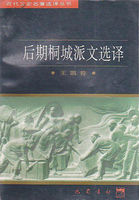This body, which I shall call the tribunate , is the preserver of the laws and of the legislative power.It serves sometimes to protect the Sovereign against the government, as the tribunes of the people did at Rome; sometimes to uphold the government against the people, as the Council of Ten now does at Venice; and sometimes to maintain the balance between the two, as the Ephors did at Sparta.
The tribunate is not a constituent part of the city, and should have no share in either legislative or executive power; but this very fact makes its own power the greater: for, while it can do nothing, it can prevent anything from being done.It is more sacred and more revered, as the defender of the laws, than the prince who executes them, or than the Sovereign which ordains them.This was seen very clearly at Rome, when the proud patricians, for all their scorn of the people, were forced to bow before one of its officers, who had neither auspices nor jurisdiction.
The tribunate, wisely tempered, is the strongest support a good constitution can have; but if its strength is ever so little excessive, it upsets the whole State.Weakness, on the other hand, is not natural to it: provided it is something, it is never less than it should be.
It degenerates into tyranny when it usurps the executive power, which it should confine itself to restraining, and when it tries to dispense with the laws, which it should confine itself to protecting.The immense power of the Ephors, harmless as long as Sparta preserved its morality, hastened corruption when once it had begun.The blood of Agis, slaughtered by these tyrants, was avenged by his successor; the crime and the punishment of the Ephors alike hastened the destruction of the republic, and after Cleomenes Sparta ceased to be of any account.Rome perished in the same way: the excessive power of the tribunes, which they had usurped by degrees, finally served, with the help of laws made to secure liberty, as a safeguard for the emperors who destroyed it.As for the Venetian Council of Ten, it is a tribunal of blood, an object of horror to patricians and people alike; and, so far from giving a lofty protection to the laws, it does nothing, now they have become degraded, but strike in the darkness blows of which no one dare take note.
The tribunate, like the government, grows weak as the number of its members increases.When the tribunes of the Roman people, who first numbered only two, and then five, wished to double that number, the senate let them do so, in the confidence that it could use one to check another, as indeed it afterwards freely did.
The best method of preventing usurpations by so formidable a body, though no government has yet made use of it, would be not to make it permanent, but to regulate the periods during which it should remain in abeyance.
These intervals, which should not be long enough to give abuses time to grow strong, may be so fixed by law that they can easily be shortened at need by extraordinary commissions.
This method seems to me to have no disadvantages, because, as I have said, the tribunate, which forms no part of the constitution, can be removed without the constitution being affected.It seems to be also efficacious, because a newly restored magistrate starts not with the power his predecessor exercised, but with that which the law allows him.6.THE DICTATORSHIP T HE inflexibility of the laws, which prevents them from adapting themselves to circumstances, may, in certain cases, render them disastrous, and make them bring about, at a time of crisis, the ruin of the State.The order and slowness of the forms they enjoin require a space of time which circumstances sometimes withhold.
A thousand cases against which the legislator has made no provision may present themselves, and it is a highly necessary part of foresight to be conscious that everything cannot be foreseen.
It is wrong therefore to wish to make political institutions so strong as to render it impossible to suspend their operation.Even Sparta allowed its laws to lapse.
However, none but the greatest dangers can counterbalance that of changing the public order, and the sacred power of the laws should never be arrested save when the existence of the country is at stake.In these rare and obvious cases, provision is made for the public security by a particular act entrusting it to him who is most worthy.This commitment may be carried out in either of two ways, according to the nature of the danger.
If increasing the activity of the government is a sufficient remedy, power is concentrated in the hands of one or two of its members: in this case the change is not in the authority of the laws, but only in the form of administering them.If, on the other hand, the peril is of such a kind that the paraphernalia of the laws are an obstacle to their preservation, the method is to nominate a supreme ruler, who shall silence all the laws and suspend for a moment the sovereign authority.In such a case, there is no doubt about the general will, and it is clear that the people's first intention is that the State shall not perish.Thus the suspension of the legislative authority is in no sense its abolition; the magistrate who silences it cannot make it speak; he dominates it, but cannot represent it.He can do anything, except make laws.
The first method was used by the Roman senate when, in a consecrated formula, it charged the consuls to provide for the safety of the Republic.
The second was employed when one of the two consuls nominated a dictator: 38 a custom Rome borrowed from Alba.
During the first period of the Republic, recourse was very often had to the dictatorship, because the State had not yet a firm enough basis to be able to maintain itself by the strength of its constitution alone.















